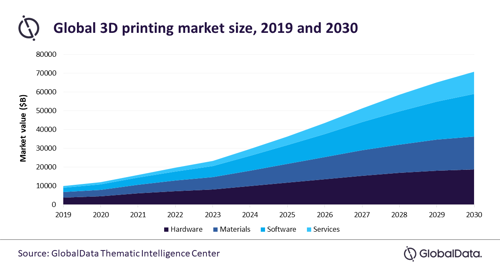GlobalData’s latest report, “Thematic Intelligence: 3D Printing”, describes 3D printing as the process of joining materials to make objects from three-dimensional model data, typically created layer upon layer. The report divides the industry’s value chain into four core layers: hardware, materials, software, and services.
The software segment of the industry will deliver the fastest growth as companies prioritize adopting workflow automation tools to reduce the time and cost of the production cycle, facilitating 3D printing’s transition into mass manufacturing.
It has been 40 years since the creation of the first 3D printed part, and the industry is well into adulthood. It has made a mark on the manufacturing world, but there is much more to do. The industry no longer needs to prove that 3D printing works but must now establish its place in the manufacturing mix.

Carolina Pinto, thematic intelligence analyst at GlobalData, commented: “3D printing has always been closely associated with prototyping and short production runs. Today, the industry wants to expand into mass manufacturing. To facilitate this transition, 3D printing companies must guarantee product standardization, particularly in industries such as automotive, aerospace, and healthcare.
"Standardisation covers best practices, regulations, and benchmarks that allow production to become infinitely repeatable. Investing in workflow automation tools will be the fastest and most cost-efficient way of achieving this.”
With many companies considering reshoring some of their supply chain operations, spurred by the COVID-19 pandemic, geopolitical concerns, and environmental, social, and governance (ESG) considerations, 3D printing could potentially disrupt the entire manufacturing industry supply chain.
David Bicknell, principal analyst, thematic intelligence at GlobalData, added: “3D printing has the potential to transform supply chain management. Additive manufacturing grew in popularity when it helped limit supply chain disruption throughout the COVID-19 pandemic. That showed the industry’s potential to play a major role in new supply chain ecosystems.
"In time, the limiting factor won’t be the technology but the willingness of executives to embrace and trust a new-look supply chain. Using 3D printing, companies can produce components locally, simplify logistics, and reduce reliance on multiple suppliers and imported products.”










